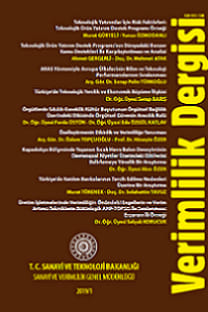Hemşirelerin İş Performansını Etkileyen Örgütsel Faktörlerin Değerlendirilmesi: Kocaeli Üniversitesi Araştırma ve Uygulama Hastanesi Örneği
-
Assesment Made by Nurses of Organizational Variables (Factors) on Nurses' Job Performance: The Example of Kocaeli University Education and Research Hospital
-,
___
- 1. Hayajneh, Ahmed Y. (2000), Identification of the Influence of Organizational Variables on Hospital Staff Nurses’ Job Performance, The University of Iowa Nursing PhD, Thesis, Graduste College The University of Iowa City, Iowa, USA
- 2. McCloskey, J. and McCain, B. (1988), Variables Related to Nurse Performance, IMAGE, 20(4), 203-2007
- 3. Brasler, M. (1993), Predictors of Clinical Performance of Graduate Nurses Participating in Preceptor Orientation Programs, Journal of Continuing Education in Nursing, 24(1), 158-165
- 4. Redd, M. And Alexander, J. (1997), Does Certification Mean Better Performance? Nursing Management, 28(2), 45-49
- 5. Slayer, J. (1995), Environmental Turbalance Impact on Nurse Performance, Journal of Nursing Administration, 25(4), 12-20
- 6. AbuAlRub, R.F. (2004), Job Stres, Job Performance and Social Support Amoing Hospital Nurses, Journal of Nursing Scholarship, 36(1), 73-78
- 7. Delvecchio, W. (1999), The Dynamic Relationship Job Satisfaction and Job Performance (career momentum), Umpublished Doctoral Disseratation, The University of Tulsa
- 8. Glazner, L. (1990), Shift Work and its Effects on Fire Fighters and Nurses, Occupational Health and Safety, m61(7), 45-57
- 9. Harvey, J. And Hannah, T. (1986), The Relationship of Shift Work to Nurses’ Satisfaction and Perceived Work Performance, Nursing Papers, 18(4), 5-14
- 10. Coffey, L.; Skipper, J. And Jung F. (1988), Nurses and Shift Work: Effects on Job Performance and Job Related Stres, Journal of Advanced Nursing, 13, 245-254
- 11. Girieco, A. (1987), Scope and Nature of Sexual Harrasment in Nursing, Journal of Sex Research, 23(2), 261-265
- 12. Libbus, K. And Bowman, K. (1994), Sexual Harrasment of Female Registered Nurses in Hospitals, Journal of Nursing Administration, 24(6), 26-31
- 13. Lucas, M. (1991), Management Style and Staff Nurse Job Satisfaction, Journal of Professional Nursing, 7(2), 119-125
- 14. Mion, M.; Mclaren, C. And Frengley, D. (1988), The Impact of Patients’ Severity of Ilness and Age on Nursing Workload, Nursing Management, 19(12), 26-33
- 15. Foxall, M.; Zimmerman, L.; Standley, R. and Bene, R. (1990), A Comparison of Frequency and Sources of Nursing Job Stres, Hospice and Surgical Nurses, Journal of Advanced Nursing, 15(5), 577-584
- ISSN: 1013-1388
- Yayın Aralığı: 4
- Başlangıç: 2004
- Yayıncı: T.C. SANAYİ VE TEKNOLOJİ BAKANLIĞI STRATEJİK ARAŞTIRMALAR VE VERİMLİLİK GENEL MÜDÜRLÜĞÜ
Paket Turlarda Müşteri Memnuniyeti ve Antalya Yöresinde Bir Uygulama Çalışması
Ömer GİDER, Yunus TAŞ, Mehmet TOP
Türkiye'de Sebze Üretimi ve Gelecek İçin Bazı Öneriler
Üniversiteye Girişte Bölgeler Arası Fırsat Eşitsizliği
Yerfıstığı İşletmelerinin Verimliliğini Etkileyen Faktörlerin Lojistik Analizi
